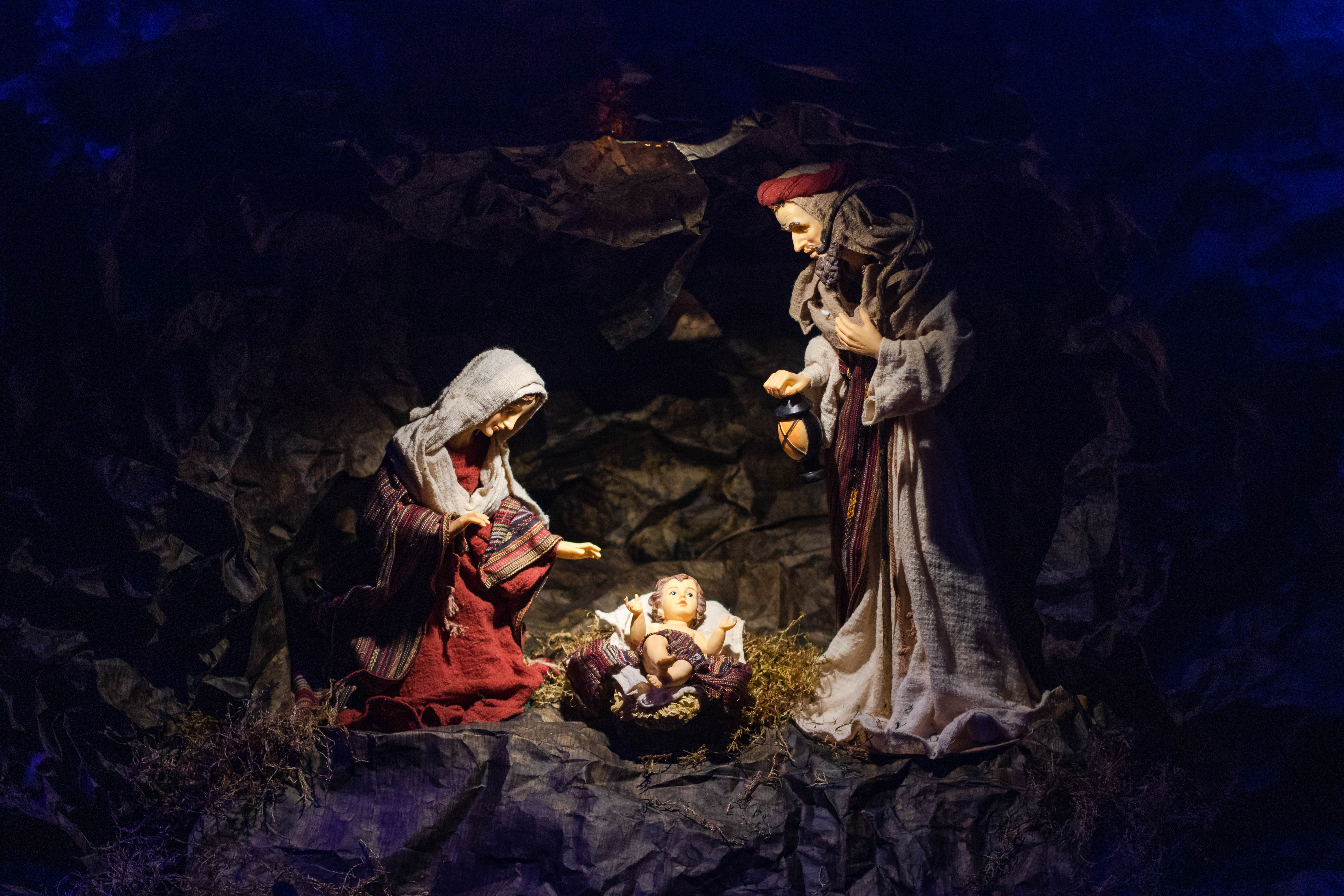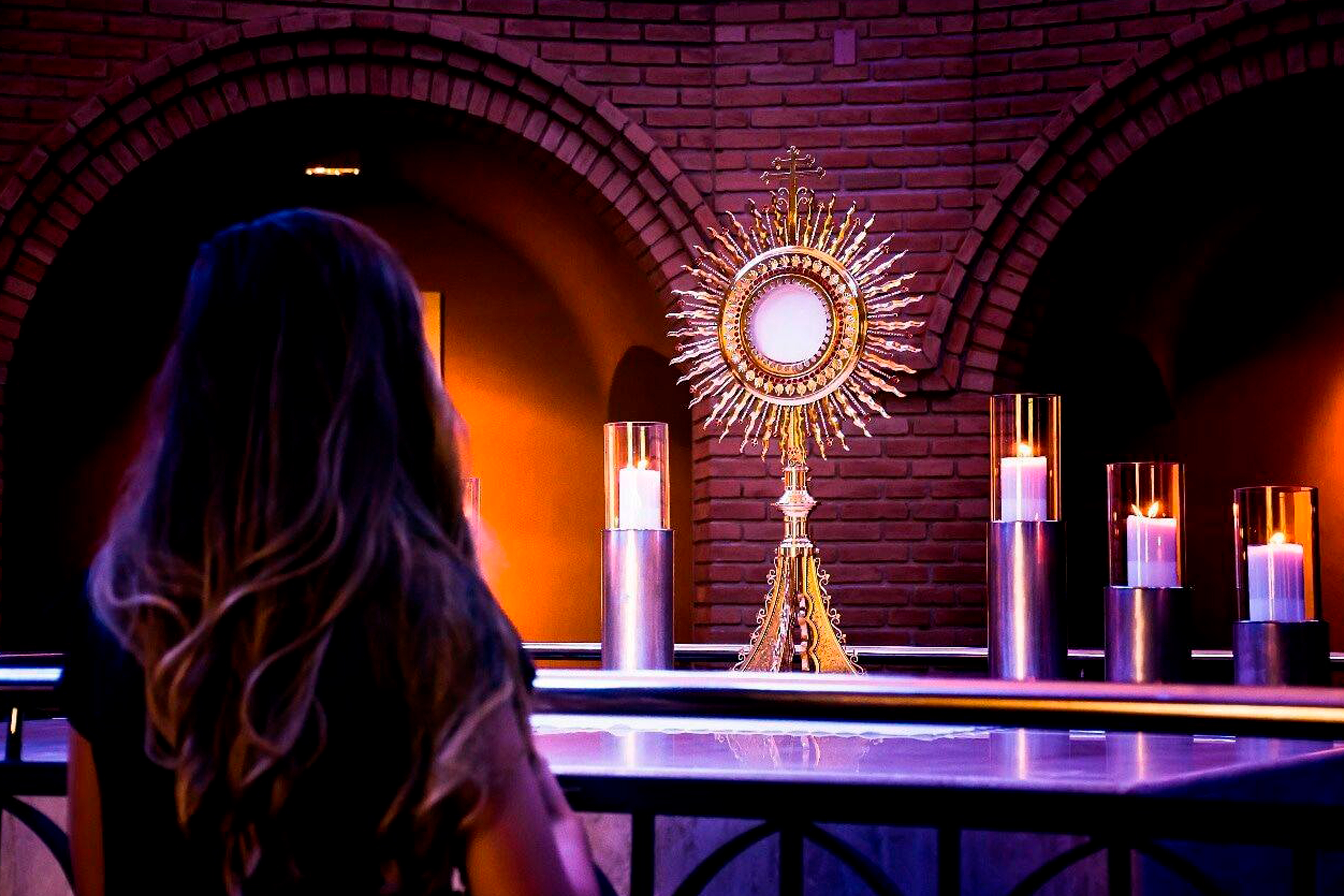“Every day he was teaching…all the people were hanging on his words” (Luke 19: 47-48).
Jesus, the Word who became flesh and dwelt among us, is our Teacher and Master. Every day we need to hear the Lord speaking. Every day we need the direction only Jesus can give. Every day society needs to be reorganized and renewed according to the words of life from the Lord of Life. Every. Day.
“Every day he was teaching…all the people were hanging on his words.”
Some days might seem to be too busy or too crazy to take time to read God’s Word in the Bible. But every day that Jesus was on this earth he taught us. God himself learned to speak in our faltering language about our very creaturely struggles, addressing our profound weakness and glaring needs for healing. He whom the angels praise with song and glory humbled himself to become a man in order to teach us, to save us, to reconcile us with the Father that we might live forever in heaven.
When Jesus ascended into heaven 2000 years ago, did his teaching end? Were we to hear his voice no more? That beloved voice that spoke to us the truth, that comforted and challenged, that proclaimed words of healing and forgiveness and courage? That voice that touched individual lives in ever so profound ways. Where can we encounter Jesus today in order to hear his voice as he speaks to us personally?
Pope Francis, in his document Desiderio Desideravi, wrote that every word, every gesture, every glance, every feeling of Jesus reaches us through the Eucharist, through the celebration of all the sacraments. It is in the Eucharist and the sacraments that we encounter Jesus. It is there that we hear him. It is there that we experience how he sees us, what he thinks about us, what he feels toward us (cf. n. 11).
It is when we receive Jesus in Communion that the events narrated in the Gospel become present to us today. When we have received Jesus in the Eucharist, when we are before him in adoration, Pope Francis helps us understand how Jesus and his teaching become present. There in prayer in the real presence of Jesus, we can each say: “I am Nicodemus, the Samaritan woman at the well, the man possessed by demons at Capernaum, the paralytic in the house of Peter, the sinful woman pardoned, the woman afflicted by hemorrhages, the daughter of Jairus, the blind man of Jericho, Zacchaeus, Lazarus, the thief and Peter both pardoned. The Lord Jesus who dies no more, who lives forever with the signs of his Passion continues to pardon us, to heal us, to save us with the power of the sacraments. It is the concrete way, by means of his incarnation, that he loves us” (n. 11).
St. Ephrem helps us reflect more deeply on this when he says: “O Lord, we cannot go to the pool of Siloam to which you sent the blind man. But we have the chalice of your Precious Blood, filled with life and light. The purer we are, the more we receive.”
“Every day he was teaching…all the people were hanging on his words.”
A friend once told me about her young nephew asking her why the people in the Church were processing to the altar. He wanted to know what it was all about. She explained that they were receiving Jesus himself in the Eucharist. He thought about that for a few moments and then he asked her, “If that is really true, then why doesn’t everyone look happy?”
These words come back to me often. As a Daughter of St. Paul I have received holy Communion and made an hour of Eucharistic adoration every day for the past 49 years. There are times when I’m distracted, tired, preoccupied, or just “not present.” It is at these times that we can recall that the people of Judea were hanging on Jesus’ every word! And I, we, have the immense privilege to be able to receive the gift Jesus gave us at the Last Supper: himself. He wanted to stay with us always: to teach us every day, to love and forgive us, heal and transform us. The Eucharist is real, it is really the body and blood, soul and divinity of Jesus Christ. In receiving the Eucharist we receive from Jesus healing and health. He teaches us and heals our sins and our ills and feeds our body and our soul. The Eucharist is life. The Eucharist brings us eternal life.
Let us, therefore, hang on Jesus’ every word. Let us approach the altar with joy and thanksgiving. Let us reserve our hearts for him through a gentle asceticism which makes room for his glory in our lives. Let us keep Jesus company in the Eucharist whenever we are able. Even if we can’t pray in a Eucharistic chapel, in spirit we can always prostrate ourselves before Jesus in the Tabernacles of the world in adoration and thanksgiving, ready to hear what he desires to say to us.
Let us hang on Jesus’ every word.
Contact the author
“Jesús enseñaba todos los días en el templo… [y] todo el pueblo estaba pendiente de sus palabras” (Lucas 19: 47-48).
Jesús, el Verbo que se hizo carne y habitó entre nosotros, es nuestro Maestro. Todos los días necesitamos escuchar al Señor hablar. Todos los días necesitamos la dirección que solo Jesús puede dar. Cada día la sociedad necesita ser reorganizada y renovada según las palabras de vida del Señor de la Vida. Cada. Día.
“Jesús enseñaba todos los días en el templo… [y] todo el pueblo estaba pendiente de sus palabras.”
Algunos días pueden parecer demasiado ocupados, demasiado locos, para tomarnos el tiempo de leer la Palabra de Dios que se encuentra en la Biblia. Pero cada día que Jesús estuvo en esta tierra nos enseñó. Dios mismo aprendió a hablar en nuestro lenguaje vacilante acerca de nuestras propias luchas como criaturas, abordando nuestra profunda debilidad y nuestras evidentes necesidades de sanación. Aquel a quien los ángeles alaban con canto y gloria, se humilló a sí mismo haciéndose hombre para enseñarnos, para salvarnos, para reconciliarnos con el Padre a fin de que vivamos para siempre en el cielo.
Cuando Jesús ascendió al cielo hace 2000 años, ¿terminaron sus enseñanzas? ¿No volveríamos a escuchar su voz? ¿Esa voz amada que nos habló la verdad, que consoló y desafió, que proclamó palabras de sanación y perdón y valentía? Esa voz que tocó vidas individuales de maneras muy profundas. ¿Dónde podemos encontrar a Jesús hoy para escuchar su voz cuando nos habla personalmente?
El Papa Francisco, en su documento Desiderio Desideravi, escribió que cada palabra, cada gesto, cada mirada, cada sentimiento de Jesús nos llega a través de la Eucaristía, a través de la celebración de todos los sacramentos. Es en la Eucaristía y en los sacramentos que encontramos a Jesús. Es allí donde lo escuchamos. Allí experimentamos cómo nos ve, qué piensa de nosotros, qué siente por nosotros (cf. n. 11).
Es cuando recibimos a Jesús en la Comunión que los acontecimientos narrados en el Evangelio se nos hacen presentes hoy. Cuando hemos recibido a Jesús en la Eucaristía, cuando estamos ante él en la adoración, el Papa Francisco nos ayuda a comprender cómo Jesús y su enseñanza se hacen presentes. Allí, en oración, en la presencia real de Jesús, podemos decir cada uno: Yo soy Nicodemo y la Samaritana, el endemoniado de Cafarnaún y el paralítico en casa de Pedro, la pecadora perdonada y la hemorroisa, la hija de Jairo y el ciego de Jericó, Zaqueo y Lázaro; el ladrón y Pedro, perdonados. El Señor Jesús que inmolado, ya no vuelve a morir; y sacrificado, vive para siempre [2], continúa perdonándonos, curándonos y salvándonos con el poder de los Sacramentos. A través de la encarnación, es el modo concreto por el que nos ama.” (n. 11).
San Efrén nos ayuda a reflexionar más profundamente sobre esto cuando dice: “Oh Señor, no podemos ir al estanque de Siloé al que enviaste al ciego. Pero tenemos el cáliz de tu Preciosa Sangre, lleno de vida y de luz. Mientras más puros somos, más recibimos”.
“Jesús enseñaba todos los días en el templo… [y] todo el pueblo estaba pendiente de sus palabras.”
Una amiga me contó una vez que su sobrino joven le preguntó por qué la gente de la Iglesia se dirigía al altar. Quería saber de qué se trataba. Mi amiga le explicó que estaban recibiendo al mismo Jesús en la Eucaristía. Pensó en eso por unos momentos y luego le preguntó: “Si eso es realmente cierto, ¿por qué no se ven felices todos?”
Estas palabras vienen a la mente con frecuencia. Como Hija de San Pablo he recibido la Sagrada Comunión y he hecho una hora de adoración Eucarística todos los días durante los últimos 49 años. Hay momentos en los que estoy distraída, cansada, preocupada o simplemente “no estoy presente”. En estos momentos podemos recordar que la gente de Judea estaba pendiente de cada palabra de Jesús. Y nosotros tenemos el inmenso privilegio de poder recibir el don que Jesús nos dio en la Última Cena: él mismo. Quería estar siempre con nosotros: enseñarnos todos los días, amarnos y perdonarnos, sanarnos y transformarnos. La Eucaristía es real, es realmente el cuerpo y la sangre, el alma y la divinidad de Jesucristo. Al recibir la Eucaristía recibimos de Jesús sanación y salud. Nos enseña y sana nuestros pecados y nuestros males y alimenta nuestro cuerpo y nuestra alma. La Eucaristía es vida. La Eucaristía nos trae la vida eterna.
Por lo tanto, aferrémonos a cada palabra de Jesús. Acerquémonos al altar con alegría y acción de gracias. Reservemos nuestro corazón para él a través de una suave ascesis que haga lugar a su gloria en nuestra vida. Hagamos compañía a Jesús en la Eucaristía siempre que podamos. Aunque no podamos orar en una capilla eucarística, en espíritu siempre podemos postrarnos ante Jesús en los Tabernáculos del mundo en adoración y acción de gracias, listos para escuchar lo que Él desea decirnos.
Aferrémonos a cada palabra de Jesús.
Comunicarse con la autora
 J.M. Pallas has had a lifelong love of Scriptures. When she is not busy with her vocation as a wife and mother to her “1 Samuel 1” son, or her vocation as a public health educator, you may find her at her parish women’s bible study, affectionately known as “The Bible Chicks.”
J.M. Pallas has had a lifelong love of Scriptures. When she is not busy with her vocation as a wife and mother to her “1 Samuel 1” son, or her vocation as a public health educator, you may find her at her parish women’s bible study, affectionately known as “The Bible Chicks.”

 Kathryn Mulderink, MA, is married to Robert, Station Manager for Holy Family Radio. Together they have seven children (including Father Rob), and seven grandchildren. She is President of the local community of Secular Discalced Carmelites and has published five books and many articles. Over the last 30 years, she has worked as a teacher, headmistress, catechist, Pastoral Associate, and DRE, and as a writer and voice talent for Catholic Radio. Currently, she serves the Church by writing and speaking, and by collaborating with various parishes and to lead others to encounter Christ and engage their faith. Her website is
Kathryn Mulderink, MA, is married to Robert, Station Manager for Holy Family Radio. Together they have seven children (including Father Rob), and seven grandchildren. She is President of the local community of Secular Discalced Carmelites and has published five books and many articles. Over the last 30 years, she has worked as a teacher, headmistress, catechist, Pastoral Associate, and DRE, and as a writer and voice talent for Catholic Radio. Currently, she serves the Church by writing and speaking, and by collaborating with various parishes and to lead others to encounter Christ and engage their faith. Her website is 
 Susan Ciancio has a BA in psychology and a BA in sociology from the University of Notre Dame, with an MA in liberal studies from Indiana University. For the past 19 years, she has worked as a professional editor and writer, editing both fiction and nonfiction books, magazine articles, blogs, educational lessons, professional materials and website content. Thirteen of those years have been in the pro-life sector. Currently Susan freelances and writes weekly for HLI, edits for American Life League, and is the executive editor of Celebrate Life Magazine. She also serves as executive editor for the Culture of Life Studies Program—an educational nonprofit program for K-12 students. You can reach her at
Susan Ciancio has a BA in psychology and a BA in sociology from the University of Notre Dame, with an MA in liberal studies from Indiana University. For the past 19 years, she has worked as a professional editor and writer, editing both fiction and nonfiction books, magazine articles, blogs, educational lessons, professional materials and website content. Thirteen of those years have been in the pro-life sector. Currently Susan freelances and writes weekly for HLI, edits for American Life League, and is the executive editor of Celebrate Life Magazine. She also serves as executive editor for the Culture of Life Studies Program—an educational nonprofit program for K-12 students. You can reach her at 
 Allison Gingras (
Allison Gingras ( 
 Sheryl is happy to be the number 1 cheerleader and supporter for her husband, Tom who is a candidate for the Permanent Diaconate in the Diocese of Kalamazoo. They are so grateful for the opportunity to grow together in this process. Sheryl’s day job is serving her community as the principal for St. Therese Catholic School in Wayland, Michigan. Since every time she thinks she gets life all figured out, she realizes just how far she has to go, St. Rita of Cascia is her go-to Saint for intercession and help. Home includes Carlyn, a very, very goofy Golden Retriever and Lucy, our not-so-little rescue puppy.
Sheryl is happy to be the number 1 cheerleader and supporter for her husband, Tom who is a candidate for the Permanent Diaconate in the Diocese of Kalamazoo. They are so grateful for the opportunity to grow together in this process. Sheryl’s day job is serving her community as the principal for St. Therese Catholic School in Wayland, Michigan. Since every time she thinks she gets life all figured out, she realizes just how far she has to go, St. Rita of Cascia is her go-to Saint for intercession and help. Home includes Carlyn, a very, very goofy Golden Retriever and Lucy, our not-so-little rescue puppy. 
 Emily Jaminet is a Catholic author, speaker, radio personality, wife, and mother of seven children. She earned a bachelor’s degree in mental health and human services from the Franciscan University of Steubenville. She is the co-founder of
Emily Jaminet is a Catholic author, speaker, radio personality, wife, and mother of seven children. She earned a bachelor’s degree in mental health and human services from the Franciscan University of Steubenville. She is the co-founder of 






